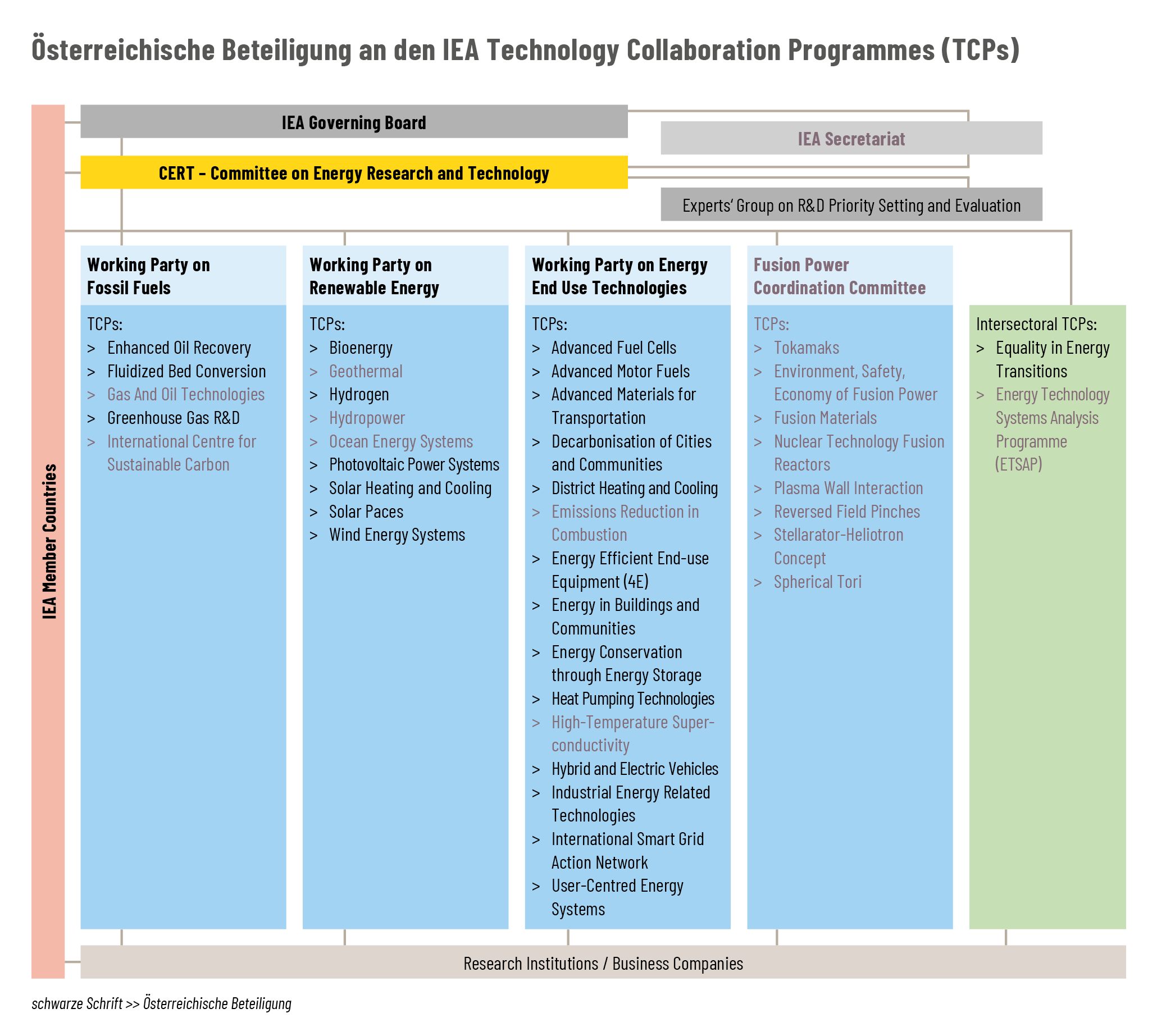IEA Structure and Committees
All decisions in the International Energy Agency are taken by the member states. At the top level sits the Governing Board, which defines the strategic direction of IEA activities; here Austria is represented by the Federal Ministry for Science, Research and Economy (BMWFW).
Committee on Energy Research and Technology (CERT)
The most important body in the field of researching and developing energy technologies is the Committee on Energy Research and Technology (CERT), in which the IEA's strategies in the area of energy research are formulated and supervised.
CERT initiates IEA research activities and steers progress in the Implementing Agreements, while also developing accompanying measures such as supporting communication strategies.
In this body Austria is represented by DI Michael Paula and Mag. Sabine Mitter.
Experts’ Group on R&D Priority Setting and Evaluation (EGRD)
The Experts' Group acts as an advisory body for CERT; its job is to develop analytical approaches to setting R&D priori¬ties, devising implementation strategies and evaluating research programmes.
In this connexion workshops are organized on specific focal topics (such as energy technology roadmaps); discussions take place with experts, and the proceedings are documented in a comprehensive report.
Working Parties
The various issues are grouped and assigned to four Working Parties:
- Renewable Energy
- End Use Technologies
- Fossil Fuels
- Fusion Power
The experts in the Working Parties analyse and evaluate the work done in the corresponding Implementing Agreements and formulate recommendations for CERT. Austria is represented in all the Working Parties except for Fusion Power.
Working Party on Renewable Energy
The Working Party on Renewable Energy currently oversees technology programmes in the fields of
- Bioenergy
- Geothermal energy
- Ocean energy
- Concentrating solar power
- Photovoltaics
- Solar heating and cooling
- Hydrogen
- Wind power
- Activities to disseminate the new technologies
In der Working Party on Renewable Energy Austria is represented by DI Andreas Indinger (Austrian Energy Agency).
Working Party on End Use Technologies
Die Working Party on End Use Technologies currently oversees 14 technology programmes in the fields of buildings, electricity, industry and transport.
Buildings
- Buildings and Communities
- District heating and cooling
- Energy storage
- Heat pumps
- Energy-efficient end-use equipment
Electricity
- Smart Grids
- Demand Side Management
- High-temperature superconductivity
- Industry
- Industrial technologies and systems
Transport
- Advanced fuel cells
- Advanced transport materials
- Advanced motor fuels
- Reducing emissions from combustion
- Hybrid and electric vehicles
In the Working Party on End Use Technologies Austria is represented by Univ.-Prof. i R. DI Dr. Hermann Halozan.
Coordination Groups Workshops
In so-called Coordination Groups Workshops particular technology programmes from the four areas handled by the End Use Working Party are placed alongside relevant technology programmes handled by other Working Parties and the IEA Secretariat, and overarching strategies and issues worked out.
Working Party on Fossil Fuels
The Working Party on Fossil Fuels currently oversees the following technology programmes:
- Multiphase flow sciences
- Enhanced oil recovery
- Clean coal centre
- Fluidized bed conversion
- Greenhouse gas R&D
In the Working Party on Fossil Fuels Austria is represented by DI Theodor Zillner and Dr. Günther Simader (Austrian Energy Agency).
Implementing Agreements
The main research instruments within the Energy Technology Network are the Implementing Agreements. In these multilateral technology programmes the countries taking part set goals and research priorities.
The member states take part in particular Implementing Agreements, depending on their own primary concerns in energy technology. The legal framework of these agreements is such that non-IEA member states can also take part, which widens the possibilities of collaboration considerably. In this way collaboration is also possible with fast-growing economies such as China, India, South Africa or Mexico.
The scope of an Implementing Agreement can range from research all the way to launching a new technology commercially – e.g. by way of joint performance testing. Implementing Agreeements normally run for five years, but can be extended for a further five years.
Each government participating in a given Implementing Agreement nominates a Contracting Party, i.e. the signatory organization (the state, a ministry or an organization specified by the state). Representatives of private enterprise can participate as sponsors. Each Implementing Agreement is managed by an Executive Commitee (ExCo), in which each Contracting Party is represented by a delegate and an alternate. The chair is selected by ballot.
These technology programmes are funded either by the partner countries providing services (task shared) or by these countries paying into a com¬mon fund (cost shared), in which case services can be outsourced.
Tasks & Annexes
The actual research and development activities take place on project level in the Tasks or Annexes.
Depending on their special interests and the availability of funds, partner countries can choose which projects they wish to take part in – a very flexible arrangement. One of the partners heads the Task or Annex as Operating Agent.
An Implementing Agreement often consists of up to 10 ongoing Tasks. In Austria the Austrian Federal Ministry for Innovation, Mobility, and Infrastructure (BMIMI) commissions national experts, research institutions and firms so that they can contribute content to the individual projects and also initiate new Tasks lead-managed by Austria.
In Austria these task shared projects are funded via the technology programme IEA Research Collaboration. As part of this, Calls for Proposals are launched every year.

